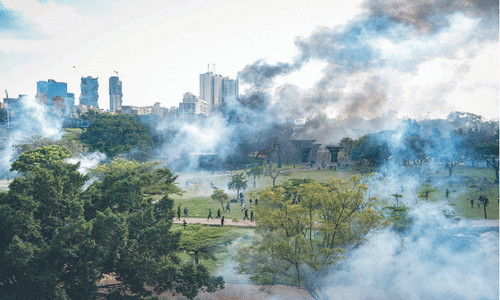DALOIPARA (Bangladesh): Bangladesh can justly claim to be a nation born of language, but its status as a cradle of linguistic diversity is under threat from nationalist pride and economic growth.
Of the more than 30 recognised languages spoken in Bangladesh, experts say 20 are now on the verge of extinction.
Many like the Laleng language spoken by the 2,000-strong Patra tribe in the country’s far northeast are inherently vulnerable, having no script and relying instead on a rich but fragile oral tradition of folk songs and story telling.
The current head of the tribe, Laxman Lal Patra, smiles as he talks of a Laleng lullaby his mother used to sing when he was a child but then frowns as he tries to recall the actual words, eventually managing just a single verse.
“Our fairy-tales, poems and songs are gone as we don’t have a written script to preserve them. Even my daughter-in-law these days hums Bangla lullabies to my grandson,” the 70-year-old said.
Bangla, or Bengali, is the undisputed heavyweight in Bangladesh’s linguistic arena, spoken by 95 per cent of the population and the sole passport to a decent education and career.
National pride in the Bangla language runs deep and is cemented with the blood of the “language martyrs” — students shot dead by police on February 21, 1952, when Bangladesh was still East Pakistan.
The students were demanding that Bangla be recognised as an official language.
The deaths triggered the start of a nationalist struggle that finally ended with the creation of Bangladesh in 1971.
February 21 is feted as a heroic national holiday in Bangladesh and is designated by Unesco as International Mother Language Day to highlight the ethno-linguistic rights of people around the world.
But now Bangla’s dominance in schools, the workplace and cultural life in general is threatening those rights in Bangladesh itself.
“Most of us can still talk in Laleng. But we’re learning Bangla fast, replacing even the most essential Laleng words,” said Patra.
“Young boys pick up Bangla expressions from schools and Bengali neighbours and never forget.”
An expanding economy, which has brought roads, electricity and television sets to all but the remotest villages, has helped smother the life out of indigenous languages that were already struggling for survival.
Dhaka University Linguistics professor Shourav Sikder, whose 2011 book “Indigenous Languages of Bangladesh” highlights the seriousness of the situation, reels off a long list of languages that are now dead or dying.
“No one talks in Mahali, Malto, Razoar and Rajbangshi these days,” he said, laying the blame squarely on the overriding state patronage and promotion of Bangla.
According to Shikder, only two tribal languages can claim to be secure, largely thanks to the fact that they have written scripts.
Mesbah Kamal, whose Research and Development Collective charity works with indigenous people, believes the loss of tribal languages verges on “cultural genocide” given the loss of identity that inevitably follows.
“And if the indigenous people lose their language, it’s not only their loss,” Kamal said.
“We are also losing diversity and plurality in our cultural life, and that will create intolerance.
“Our students fought for the rights of their mother language, thanks to which we’ve got an independent Bangladesh. Yet it’s a shame that on the same land other languages are dying out fast,” Kamal said.
The government rejects accusations of neglect, with Cultural Affairs Secretary Suraiya Begum insisting that tribal groups “have scope to practice their language and culture” through a variety of state-run bodies.
Begum particularly pointed to the International Mother Language Institute set up in 2001 to preserve and study the ethnic languages spoken in Bangladesh and across the world.
But critics say such institutions are mere window dressing, and totally ignore the ground realities of Bangla’s steamroller dominance.
“My beautiful language is dying,” said Patra.
“Our young people have turned their backs on it. To them jobs and education are everything.”—AFP












































Dear visitor, the comments section is undergoing an overhaul and will return soon.